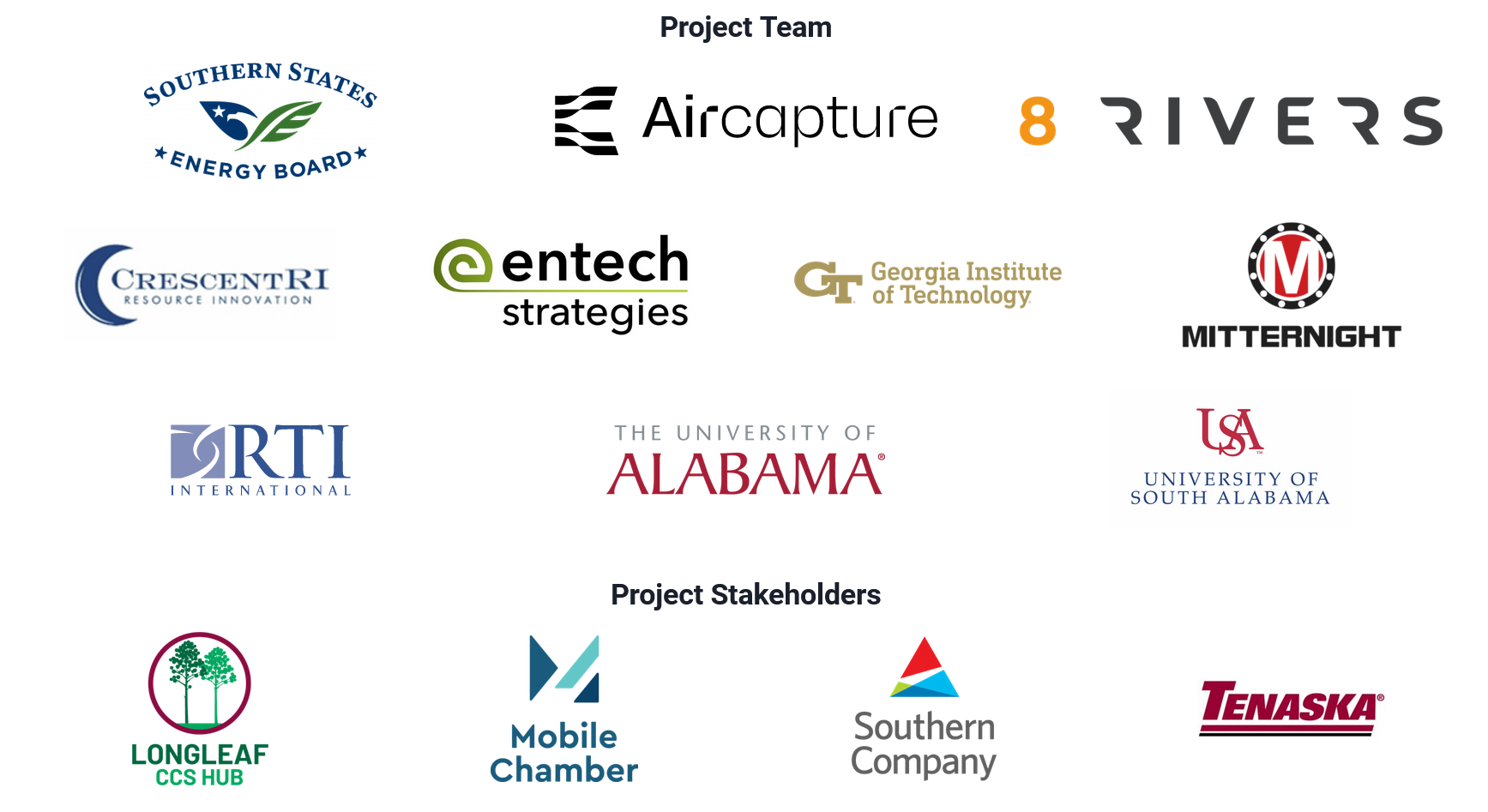Georgia Tech’s New Partnership to Capture Carbon Dioxide Directly From Air
Sep 12, 2023 — Atlanta, GA

Partners in the SEDAC Hub Project
A new $20.5 million Department of Energy project will establish a direct air capture hub in northern Mobile County, Alabama.
Carbon dioxide (CO2), the primary pollutant from emissions past and present, stays in the atmosphere for hundreds of years, leading to climate change and its many consequences. Cleaning up these legacy emissions is an essential step in the creation of a sustainable, low-carbon economy. Direct Air Capture (DAC) is an innovative solution that captures CO2 directly from the air and reduces its levels in the atmosphere. The CO2 is then stored safely and securely or utilized to make value-added products.
The Georgia Institute of Technology collaborated with the Southern States Energy Board and its partners in the deployment of a direct air capture hub in Mobile County, Alabama. Known as the Southeast DAC (SEDAC) Hub, the project is funded by the U.S. Department of Energy’s Office of Fossil Energy and Carbon Management and will deploy cutting-edge DAC technologies to capture CO2 from the air. Steered by Joe Hagerman, director of NEETRAC, and Matthew Realff, professor in the School of Chemical and Biomolecular Engineering, David Wang Sr. Fellow, and initiative lead for circular carbon economy at the Strategic Energy Institute (SEI), the team will serve the educational, workforce, and community development functions in the project that is led by the Southern States Energy Board. Other partners include 8 Rivers, Aircapture, Crescent Resource Innovation, ENTECH Strategies, Mitternight, RTI International, the University of Alabama, and the University of South Alabama. Stakeholders include Southern Company and its Alabama Power Company subsidiary, Tenaska Sequestration Solutions, and the Mobile Chamber of Commerce, among many others.
“We are thrilled to partner with the U.S. Department of Energy and the Southern States Energy Board in the SEDAC Hub project,” said Tim Lieuwen, SEI executive director, Regents’ Professor, and David S. Lewis Jr. Chair. “The project is important to the decarbonization efforts in the Southeast and will further amplify the Southeast’s leadership in the clean tech economy.”
Georgia Tech’s role will be supported by the Georgia Tech Center for Sustainable Communities Research and Education (SCoRE) and the Direct Air Capture Center (DirACC). Led by Jennifer Hirsch, adjunct associate professor in the School of City and Regional Planning, and senior director of Serve-Learn-Sustain at Georgia Tech, SCoRE engages faculty, students, and staff in long-term, strategic research and education collaborations with community partners, focusing on sustainability and connecting the historically underrepresented communities and students in the Atlanta region, the state of Georgia, and the Southeast. DirACC is the culmination of more than a decade of research at Georgia Tech to develop and evaluate materials, contactors, and processes that extract carbon dioxide directly from the atmosphere. DirACC creates a forum for collaborative research on negative emission technologies and DAC, bringing together researchers from across the Institute working in energy, sustainability, policy, and related fields. DirACC is jointly led by Christopher Jones, professor and John F. Brock III School Chair in the School of Chemical and Biomolecular Engineering, and Realff.
Mobile County is an ideal location to support the initial phases of a DAC hub. It is home to industrial facilities, large tracts of available land, and appropriate subsurface geology to support the creation of a sustainable, CO2-based economy. In addition, numerous opportunities exist to employ the region’s skilled workforce in pursuit of a variety of jobs beyond permanent storage in subsurface reservoirs (e.g., CO2 to fuels). The SEDAC Hub will not only help reduce local emissions, but also help create a carbon reduction ecosystem in the area — and the Gulf South more broadly.
The project team has established robust community outreach and a two-way engagement program that includes a community advisory board composed of diverse local stakeholders; industry partners interested in decarbonization; and local community colleges, universities, and trade schools. The board will provide input to achieve community-supported DAC growth and guide the development of SEDAC’s community benefits plan.
Visit the Project Page to learn more about the project and the team members.
Energy Research at Georgia Tech
The Georgia Institute of Technology is one of the top public research universities in the U.S., developing leaders who advance technology and improve the human condition. Georgia Tech has researchers working across the energy value chain and leads in scientific leadership in basic and applied science in carbon capture, industrial decarbonization, and related social sciences. Georgia Tech is consistently rated among the top universities in the nation for graduation of underrepresented minorities in engineering, physical sciences, and energy-related fields. Serving as a regional resource to help communities understand how they can transition to a clean energy economy, Georgia Tech is the southeastern leader in achieving regional impact through education and contributions to the community.
Priya Devarajan | SEI Communications Program Manager




